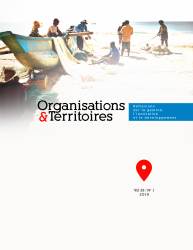Pour une approche interculturelle dans l’étude de la relation entre les bénévoles et les communautés hôtes dans le bénévolat international
DOI:
https://doi.org/10.1522/revueot.v28n1.1020Keywords:
International volunteeringAbstract
The literature on the relationship between volunteers and host communities in international volunteering is divided into two opposing positions. The first is enthusiastic and argues that international volunteering promotes better intercultural relations than tourism. The second is more critical and promotes the reproduction of postcolonial power relations. To surpass this opposition, this article proposes an intercul-
tural theoretical framework inspired by Gadamer's hermeneutic philosophy, systemic approaches to human relations, communication ethnography and interactive sociolinguistics. To illustrate the contribution of this framework, we will present a case study on the relationship between volunteers and their host families in “Quebec Sans Frontières” internships in Senegal. The case study will highlight three concomitant dynamics in this relationship: the (co-)production of cultural knowledge, the negotiation of new hybrid and temporary communication systems and the development of intercultural know-how.



